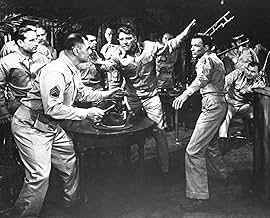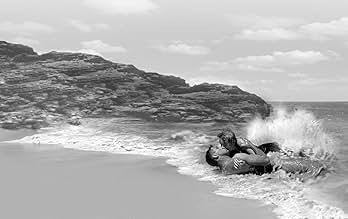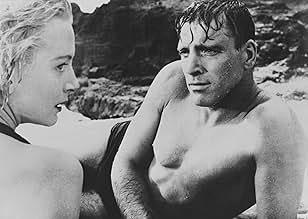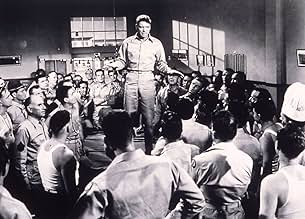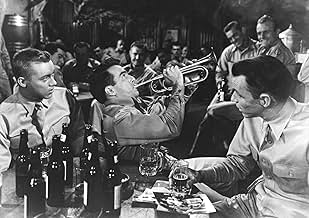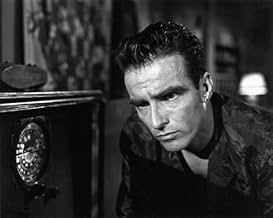VALUTAZIONE IMDb
7,6/10
52.913
LA TUA VALUTAZIONE
Alle Hawaii nel 1941, un soldato viene crudelmente punito per non aver fatto boxe nella squadra della sua unità militare, mentre la moglie del suo capitano e il secondo in comando si stanno ... Leggi tuttoAlle Hawaii nel 1941, un soldato viene crudelmente punito per non aver fatto boxe nella squadra della sua unità militare, mentre la moglie del suo capitano e il secondo in comando si stanno innamorando.Alle Hawaii nel 1941, un soldato viene crudelmente punito per non aver fatto boxe nella squadra della sua unità militare, mentre la moglie del suo capitano e il secondo in comando si stanno innamorando.
- Regia
- Sceneggiatura
- Star
- Vincitore di 8 Oscar
- 26 vittorie e 9 candidature totali
Claude Akins
- Sgt. 'Baldy' Dhom
- (non citato nei titoli originali)
Vicki Bakken
- Suzanne
- (non citato nei titoli originali)
Margaret Barstow
- Roxanne
- (non citato nei titoli originali)
Recensioni in evidenza
One of the big blockbuster best sellers of the post World War II years is James Jones's From Here to Eternity, a tale of the peacetime army in Hawaii before Pearl Harbor. The book was definitely going to be made into a film and it was only a question of casting to make it a success.
Director Fred Zinneman had a good intuitive sense about casting here, even against type. The two principal female parts were done against type. Deborah Kerr who made a career of playing respectable women played a captain's wife who's drinking and playing around. Not that husband Philip Ober is letting grass grow under his feet either, but Kerr's latest sexual exploit involves her with the First Sergeant of her husband's company, Burt Lancaster.
Donna Reed, who up to that point was best known for being Mary Bailey in It's A Wonderful Life, plays a prostitute here. A girl from the wrong side of the tracks, jilted by a rich boyfriend stateside, she's in Hawaii to make money and then go home and buy some respectability. She's not looking for romance with any soldiers, but you can't plan these things.
Especially Montgomery Clift if he comes in your life. It's been argued that this is Clift's greatest role and a case can sure be made for it. His character of Robert E. Lee Pruitt is like so many who still join the army today, from small town America who have no future there and find a home in the Armed Services. What makes Clift unique is that strong sense of individualism he can't control in an organization that does not encourage individuality.
Clift and Lancaster are a great study in contrasts and that's what drives From Here to Eternity. Lancaster as Sergeant Milt Warden is the ultimate professional soldier, held in the highest regard by his men. Lancaster is someone who knows how to work the system, you see it in the way he manipulates his captain. Of course he's got to be a manipulator there since he's having an affair with Deborah Kerr. He tries to protect Clift from himself and ultimately fails.
Clift has transferred into an infantry company and he was at one time a boxer. But he blinded someone in a fight and quit boxing. Philip Ober who prides himself on having several champions in various weight classes worked to get Clift in his company. Clift upsets his plans by refusing to box so he has the various sergeants give him "the treatment."
Clift's best friend in the company is a tough street wise soldier from the big city named Angelo Maggio, played by Frank Sinatra. Sinatra read the book and knew this part was for him. He did everything he had to do to get that part, including working for scale. At the time Sinatra was considered a has been as singer and actor. Sinatra was right on the money in terms of picking a role. His faith in himself and Columbia Pictures and Fred Zinneman's faith in him netted him an Oscar for Best Supporting Actor, one of eight awards won by From Here to Eternity.
By the way Sinatra credited both Lancaster and Clift in helping him through this film as a dramatic actor. Lancaster and Sinatra didn't inhabit the same Hollywood orbit, but they remained friends for life. The same could not be said for Clift. Allegedly, some five or six years after From Here to Eternity and after Monty Clift's automobile accident while shooting Raintree County, Clift at some party at Sinatra's made a drunken pass at one of Sinatra's retainers. That got him kicked out of Sinatra's circle permanently.
In fact From Here to Eternity was also the Best Picture of 1953, with Zinneman getting his second Best Director Oscar in a row after the one he took home in 1952 for High Noon. Donna Reed won for Best Supporting Acress. Burt Lancaster and Montgomery Clift were both nominated for Best Actor, but split the vote allowing William Holden to win for Stalag 17. Another great acting job itself. And Kerr was up for Best Actress, but lost to Audrey Hepburn for Roman Holiday.
From Here to Eternity is a film loaded with good actors in small roles who got their first notice in this film. Ernest Borgnine, Robert J. Wilkie, Claude Akins, Jack Warden, Mickey Shaughnessy, all play various soldiers and each one is memorable. Especially Borgnine as the vicious sadistic sergeant of the stockade.
TV's Superman was in From Here to Eternity also. George Reeves who was looking to escape the typecasting from Superman has a part as another sergeant who warns Lancaster about Deborah Kerr. He gave a fine performance, but most of it wound up on the cutting room floor. That would have unforeseen tragic consequences.
This is not any kind of glamorous army. These people are all too real and not very noble. The original novel was toned down quite a bit for the screen. But when the attack on Pearl Harbor comes, the men rise to the occasion, do their jobs in a more than competent manner and led by Burt Lancaster in that company. It's these men who won that war in the Pacific and the one in Europe as well and From Here to Eternity despite the less than noble portrayals of them as individuals is a great tribute to them as a team.
Director Fred Zinneman had a good intuitive sense about casting here, even against type. The two principal female parts were done against type. Deborah Kerr who made a career of playing respectable women played a captain's wife who's drinking and playing around. Not that husband Philip Ober is letting grass grow under his feet either, but Kerr's latest sexual exploit involves her with the First Sergeant of her husband's company, Burt Lancaster.
Donna Reed, who up to that point was best known for being Mary Bailey in It's A Wonderful Life, plays a prostitute here. A girl from the wrong side of the tracks, jilted by a rich boyfriend stateside, she's in Hawaii to make money and then go home and buy some respectability. She's not looking for romance with any soldiers, but you can't plan these things.
Especially Montgomery Clift if he comes in your life. It's been argued that this is Clift's greatest role and a case can sure be made for it. His character of Robert E. Lee Pruitt is like so many who still join the army today, from small town America who have no future there and find a home in the Armed Services. What makes Clift unique is that strong sense of individualism he can't control in an organization that does not encourage individuality.
Clift and Lancaster are a great study in contrasts and that's what drives From Here to Eternity. Lancaster as Sergeant Milt Warden is the ultimate professional soldier, held in the highest regard by his men. Lancaster is someone who knows how to work the system, you see it in the way he manipulates his captain. Of course he's got to be a manipulator there since he's having an affair with Deborah Kerr. He tries to protect Clift from himself and ultimately fails.
Clift has transferred into an infantry company and he was at one time a boxer. But he blinded someone in a fight and quit boxing. Philip Ober who prides himself on having several champions in various weight classes worked to get Clift in his company. Clift upsets his plans by refusing to box so he has the various sergeants give him "the treatment."
Clift's best friend in the company is a tough street wise soldier from the big city named Angelo Maggio, played by Frank Sinatra. Sinatra read the book and knew this part was for him. He did everything he had to do to get that part, including working for scale. At the time Sinatra was considered a has been as singer and actor. Sinatra was right on the money in terms of picking a role. His faith in himself and Columbia Pictures and Fred Zinneman's faith in him netted him an Oscar for Best Supporting Actor, one of eight awards won by From Here to Eternity.
By the way Sinatra credited both Lancaster and Clift in helping him through this film as a dramatic actor. Lancaster and Sinatra didn't inhabit the same Hollywood orbit, but they remained friends for life. The same could not be said for Clift. Allegedly, some five or six years after From Here to Eternity and after Monty Clift's automobile accident while shooting Raintree County, Clift at some party at Sinatra's made a drunken pass at one of Sinatra's retainers. That got him kicked out of Sinatra's circle permanently.
In fact From Here to Eternity was also the Best Picture of 1953, with Zinneman getting his second Best Director Oscar in a row after the one he took home in 1952 for High Noon. Donna Reed won for Best Supporting Acress. Burt Lancaster and Montgomery Clift were both nominated for Best Actor, but split the vote allowing William Holden to win for Stalag 17. Another great acting job itself. And Kerr was up for Best Actress, but lost to Audrey Hepburn for Roman Holiday.
From Here to Eternity is a film loaded with good actors in small roles who got their first notice in this film. Ernest Borgnine, Robert J. Wilkie, Claude Akins, Jack Warden, Mickey Shaughnessy, all play various soldiers and each one is memorable. Especially Borgnine as the vicious sadistic sergeant of the stockade.
TV's Superman was in From Here to Eternity also. George Reeves who was looking to escape the typecasting from Superman has a part as another sergeant who warns Lancaster about Deborah Kerr. He gave a fine performance, but most of it wound up on the cutting room floor. That would have unforeseen tragic consequences.
This is not any kind of glamorous army. These people are all too real and not very noble. The original novel was toned down quite a bit for the screen. But when the attack on Pearl Harbor comes, the men rise to the occasion, do their jobs in a more than competent manner and led by Burt Lancaster in that company. It's these men who won that war in the Pacific and the one in Europe as well and From Here to Eternity despite the less than noble portrayals of them as individuals is a great tribute to them as a team.
Classic 50's Hollywood feature documenting the lives and times of the US Army personnel in Hawaii leading up to the Japanese air attack on the Pearl Harbour naval base which precipitated the US entry into the second world war. Shot in black and white by Fred Zinnemann to emphasise the war-time setting, the drama is peopled with convincingly realistic characters with a credible, episodic narrative edging ever closer to the pivotal date of December 7th.
Multiple plot lines are skilfully interwoven until their climactic convergence at the end aided by top acting from a superb cast. The dramatic thread to the film is Montgomery Clift's Prewett character and his relationships with the characters played by Burt Lancaster, the firm but fair sergeant himself drawn into a sexually charged relationship with his superior officer captain's disaffected wife, played against type by Deborah Kerr, Donna Reed as the "hostess" he falls in love with and especially Frank Sinatra's rascally but likeable and always supportive Maggio.
Sinatra famously begged for the chance to show his acting skill in a straight role to reignite his career and duly given the chance, he grabs it with both hands. Lancaster and Kerr fire up the screen in their doomed relationship, especially in the famous scene by the crashing waves, Reed plays her part with admirable restraint but Clift's acting exceeds them all, whether in his reluctant fight scenes, blowing a bugle like Satchmo or playing a drunk after he's exacted revenge on Maggio's tormentor, played memorably by the recently deceased Ernst Borgnine.
The action climax as the Japanese attack is thrillingly portrayed especially the high camera shots, although I would question the too obvious and thus jarring insertion of real footage of the actual attack.
Controversial in its day for its unblinkingly honest depiction of the US army, it can be seen now as one of the best films of the 50's, a master class in dramatic narrative and character acting.
Multiple plot lines are skilfully interwoven until their climactic convergence at the end aided by top acting from a superb cast. The dramatic thread to the film is Montgomery Clift's Prewett character and his relationships with the characters played by Burt Lancaster, the firm but fair sergeant himself drawn into a sexually charged relationship with his superior officer captain's disaffected wife, played against type by Deborah Kerr, Donna Reed as the "hostess" he falls in love with and especially Frank Sinatra's rascally but likeable and always supportive Maggio.
Sinatra famously begged for the chance to show his acting skill in a straight role to reignite his career and duly given the chance, he grabs it with both hands. Lancaster and Kerr fire up the screen in their doomed relationship, especially in the famous scene by the crashing waves, Reed plays her part with admirable restraint but Clift's acting exceeds them all, whether in his reluctant fight scenes, blowing a bugle like Satchmo or playing a drunk after he's exacted revenge on Maggio's tormentor, played memorably by the recently deceased Ernst Borgnine.
The action climax as the Japanese attack is thrillingly portrayed especially the high camera shots, although I would question the too obvious and thus jarring insertion of real footage of the actual attack.
Controversial in its day for its unblinkingly honest depiction of the US army, it can be seen now as one of the best films of the 50's, a master class in dramatic narrative and character acting.
10nawknek
"From Here to Eternity" contains the best performance delivered by an actor of any gender on celluloid. Montgomery Clift is assertive, funny, tough, sensitive and charismatic in the pivotal role of Robert E. Lee Prewitt, the rebellious loner with the streak of nobility. It is easy to see why James Dean idolized him after seeing his portrayal in the film. It is also a shame modern actors don't mention his name more often when listing their influences. As often noted, he preceded Brando by two years (he first appeared in Red River, released in 1948; Brando bowed in The Men in 1950)and created the arch-type of the 1950's rebel. But due to his intelligence, Clift also informed his characters with a sense of purpose. He didn't simply rebel. For instance, in Eternity, he apologises after an angry outbreak at his girlfriend. Instead of appearing weak, he impressed me all the more for doing so. It makes him appear more mature than the typical rebel. In another instance, when he feels his friend Maggio is being unfairly attacked, he "stares down" the attacker proving he looks out for his friend, another attractive quality. When the non-coms dole out extra punishment to him to force him to box, he refuses to file a complaint but likewise refuses to comply to their demands. Such moments distinguish Clift from other, more typically macho Hollywood leading men of the era and contributed greatly to Eternity's long initial run at the box office and its status as a classic piece of Hollywood cinema. It is time someone set the record straight and restored Montgomery Clift's name to its rightful place in the pantheon of Hollywood's great leading men. For proof, look no further than From Here to Eternity.
The folks who made PEARL HARBOR should have done their homework on how to bring a personal romance into a historical event. This film should have been at the top of their list.
The Pearl Harbor attack is the climax of the film as well as of the various intricate human relationships in the film. This is a classic piece of romantic history, and the beach scene is probably one of the most erotic ever done -- all the more impressive because it has no nudity.
This is a real saga of human passion and how it is affected by history. Whether you see PEARL HARBOR or not is up to you. But definitely see this film.
The Pearl Harbor attack is the climax of the film as well as of the various intricate human relationships in the film. This is a classic piece of romantic history, and the beach scene is probably one of the most erotic ever done -- all the more impressive because it has no nudity.
This is a real saga of human passion and how it is affected by history. Whether you see PEARL HARBOR or not is up to you. But definitely see this film.
In hindsight, this 1953 classic doesn't seem as much a military drama as it does a highly charged soap opera, which shouldn't come as a surprise given that master filmmaker Fred Zinnemann ("the Nun's Story") was at the helm. The veteran director upended the western genre just a year earlier with the Gary Cooper classic "High Noon", and he places the same incendiary focus of character over action here, that is, until the inevitable climax which uses the Japanese attack on Pearl Harbor as a catharsis for the characters' dilemmas now dwarfed by the coming world war.
Based on James Jones' epic novel, screenwriter Daniel Taradash manages to reduce the complexity of the book's themes without trivializing them, and then-offbeat casting enhances the movie immeasurably. Set on a U.S. Army base in Hawaii in the months leading up to the attack, the focus is on two men, both dedicated to the military with no aspirations to become the officers they have grown to detest. One is Private Robert E. Prewitt, a talented boxer (and bugler) who refuses to fight on his regiment's team since blinding a sparring partner. The other is First Sergeant Milton Warden, a take-charge, professional soldier who earns the trust of his men even as he kowtows to his weak-willed commanding officer.
Life in the barracks is fraught with adversarial personalities, chief among them Private Angelo Maggio, Prewitt's loudmouthed best friend, and Staff Sergeant "Fatso" Judson, the sadistic stockade warden. Both Prewitt and Warden meet women who seek to change their lives. Prewitt finds cynical nightclub "hostess" Lorene at a brothel masquerading as a social club, while Warden embarks on a passionate affair with his commanding officer's wayward wife Karen. Burt Lancaster is well cast as Warden, and he brings surprising nuance to his character's clandestine encounters with Karen. However, it's Montgomery Clift - despite looking too slight to be genuinely believable as a boxer - who transcends his loner role by playing off his innately sensitive nature to portray a man who will never sacrifice his honor despite how dire the consequences. Well within his comfort zone, Frank Sinatra's turn as Maggio is small but impactful.
Still two years away from "Marty", Ernest Borgnine makes Judson's malevolence palpable in just a few scenes. Deborah Kerr submerges her Scottish accent and previous lady-like demeanor to reveal the embittered, sexually assertive side of Karen without sacrificing any of the character's vulnerability. The legendary, much-parodied beach scene with Lancaster still sizzles after all these years. Similarly, Donna Reed foregoes her good-girl image (epitomized by her memorable turn as Mary Bailey in "It's a Wonderful Life") to play the sultry, delusional Lorene. The 2003 DVD comes with a small set of extras - a three-minute making-of retrospective short, a nine-minute collection of on-set footage and interviews from a documentary entitled "Fred Zinnemann: As I See It", and the original theatrical trailer. The best extra is the commentary track from Tim Zinnemann (the director's son) and screenwriter Alvin Sargent ("Spider-Man 2"), who had a small role in the movie.
Based on James Jones' epic novel, screenwriter Daniel Taradash manages to reduce the complexity of the book's themes without trivializing them, and then-offbeat casting enhances the movie immeasurably. Set on a U.S. Army base in Hawaii in the months leading up to the attack, the focus is on two men, both dedicated to the military with no aspirations to become the officers they have grown to detest. One is Private Robert E. Prewitt, a talented boxer (and bugler) who refuses to fight on his regiment's team since blinding a sparring partner. The other is First Sergeant Milton Warden, a take-charge, professional soldier who earns the trust of his men even as he kowtows to his weak-willed commanding officer.
Life in the barracks is fraught with adversarial personalities, chief among them Private Angelo Maggio, Prewitt's loudmouthed best friend, and Staff Sergeant "Fatso" Judson, the sadistic stockade warden. Both Prewitt and Warden meet women who seek to change their lives. Prewitt finds cynical nightclub "hostess" Lorene at a brothel masquerading as a social club, while Warden embarks on a passionate affair with his commanding officer's wayward wife Karen. Burt Lancaster is well cast as Warden, and he brings surprising nuance to his character's clandestine encounters with Karen. However, it's Montgomery Clift - despite looking too slight to be genuinely believable as a boxer - who transcends his loner role by playing off his innately sensitive nature to portray a man who will never sacrifice his honor despite how dire the consequences. Well within his comfort zone, Frank Sinatra's turn as Maggio is small but impactful.
Still two years away from "Marty", Ernest Borgnine makes Judson's malevolence palpable in just a few scenes. Deborah Kerr submerges her Scottish accent and previous lady-like demeanor to reveal the embittered, sexually assertive side of Karen without sacrificing any of the character's vulnerability. The legendary, much-parodied beach scene with Lancaster still sizzles after all these years. Similarly, Donna Reed foregoes her good-girl image (epitomized by her memorable turn as Mary Bailey in "It's a Wonderful Life") to play the sultry, delusional Lorene. The 2003 DVD comes with a small set of extras - a three-minute making-of retrospective short, a nine-minute collection of on-set footage and interviews from a documentary entitled "Fred Zinnemann: As I See It", and the original theatrical trailer. The best extra is the commentary track from Tim Zinnemann (the director's son) and screenwriter Alvin Sargent ("Spider-Man 2"), who had a small role in the movie.
Oscars Best Picture Winners, Ranked
Oscars Best Picture Winners, Ranked
See the complete list of Oscars Best Picture winners, ranked by IMDb ratings.
Lo sapevi?
- QuizMontgomery Clift threw himself into the character of Prewitt, learning to play the bugle (even though he knew he'd be dubbed) and taking boxing lessons. Fred Zinnemann said, "Clift forced the other actors to be much better than they really were. That's the only way I can put it. He got performances from the other actors, he got reactions from the other actors that were totally genuine."
- BlooperThe impromptu bugle solo in the club includes notes that only a trumpet could hit.
- Citazioni
Robert E. Lee "Prew' Prewitt: Nobody ever lies about being lonely.
- Curiosità sui creditiOpening credits prologue: SCHOFIELD BARRACKS HAWAII 1941
- ConnessioniEdited from 7 dicembre (1943)
- Colonne sonoreRe-enlistment Blues
(1953)
by James Jones, Fred Karger, Robert Wells
Sung by men in the barracks twice
Played often in the score
I più visti
Accedi per valutare e creare un elenco di titoli salvati per ottenere consigli personalizzati
Dettagli
- Data di uscita
- Paese di origine
- Lingua
- Celebre anche come
- De aquí a la eternidad
- Luoghi delle riprese
- Halona Beach Cove, O'ahu, Hawaii, Stati Uniti(Warden and Karen's kissing in the surf scene)
- Azienda produttrice
- Vedi altri crediti dell’azienda su IMDbPro
Botteghino
- Budget
- 1.650.000 USD (previsto)
- Lordo Stati Uniti e Canada
- 36.416 USD
- Fine settimana di apertura Stati Uniti e Canada
- 18.176 USD
- 7 dic 2003
- Lordo in tutto il mondo
- 36.416 USD
- Tempo di esecuzione1 ora 58 minuti
- Colore
- Mix di suoni
- Proporzioni
- 1.37 : 1
Contribuisci a questa pagina
Suggerisci una modifica o aggiungi i contenuti mancanti

Divario superiore
By what name was Da qui all'eternità (1953) officially released in India in Hindi?
Rispondi


